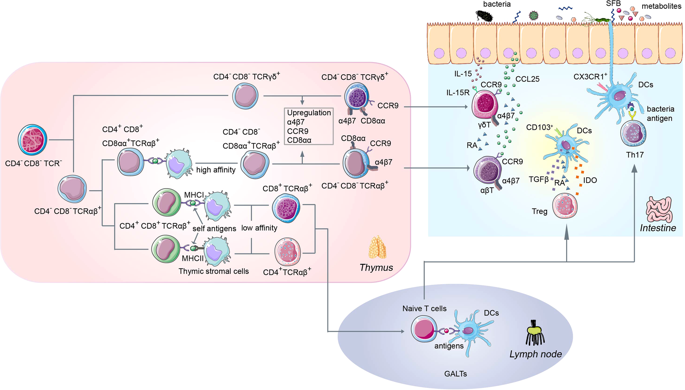当前位置:
X-MOL 学术
›
Cell. Mol. Immunol.
›
论文详情
Our official English website, www.x-mol.net, welcomes your
feedback! (Note: you will need to create a separate account there.)
T lymphocytes in the intestinal mucosa: defense and tolerance.
Cellular & Molecular Immunology ( IF 21.8 ) Pub Date : 2019-02-20 , DOI: 10.1038/s41423-019-0208-2 Hongdi Ma 1 , Wanyin Tao 1 , Shu Zhu 1, 2
Cellular & Molecular Immunology ( IF 21.8 ) Pub Date : 2019-02-20 , DOI: 10.1038/s41423-019-0208-2 Hongdi Ma 1 , Wanyin Tao 1 , Shu Zhu 1, 2
Affiliation

|
Although lymphocytes are known to circulate throughout lymphoid tissues and blood, they also establish residency in nonlymphoid organs, most prominently in barrier tissues, such as the intestines. The adaptation of T lymphocytes to intestinal environments requires constant discrimination between natural stimulation from commensal flora and food and pathogens that need to be cleared. Genetic variations that cause a defective defense or a break in tolerance along with environmental cues, such as infection or imbalances in the gut microbiota known as dysbiosis, can trigger several immune disorders via the activation of T lymphocytes in the intestines. Elucidation of the immune mechanisms that distinguish between commensal flora and pathogenic organisms may reveal therapeutic targets for the prevention or modulation of inflammatory diseases and boost the efficacy of cancer immunotherapy. In this review, we discuss the development and adaptation of T lymphocytes in the intestine, how these cells protect the host against pathogenic infections while tolerating food antigens and commensal microbiota, and the potential implications of targeting these cells for disease management and therapeutics.
中文翻译:

肠粘膜中的T淋巴细胞:防御和耐受。
尽管已知淋巴细胞在整个淋巴组织和血液中循环,但它们也可以在非淋巴器官中驻留,尤其是在肠等屏障组织中。T淋巴细胞适应肠道环境需要不断地区分共生菌群和食物的自然刺激以及需要清除的病原体。导致防御能力不足或耐受性破坏的遗传变异以及环境提示,例如感染或肠道菌群失调(称为营养不良),会通过肠内T淋巴细胞的活化而引发多种免疫疾病。阐明区分共生菌群和病原性生物的免疫机制可能揭示预防或调节炎性疾病的治疗靶点,并提高癌症免疫疗法的功效。在这篇综述中,我们讨论了肠中T淋巴细胞的发育和适应性,这些细胞如何在耐受食物抗原和共生菌群的同时保护宿主免受病原体感染,以及针对这些细胞进行疾病管理和治疗的潜在意义。
更新日期:2019-02-20
中文翻译:

肠粘膜中的T淋巴细胞:防御和耐受。
尽管已知淋巴细胞在整个淋巴组织和血液中循环,但它们也可以在非淋巴器官中驻留,尤其是在肠等屏障组织中。T淋巴细胞适应肠道环境需要不断地区分共生菌群和食物的自然刺激以及需要清除的病原体。导致防御能力不足或耐受性破坏的遗传变异以及环境提示,例如感染或肠道菌群失调(称为营养不良),会通过肠内T淋巴细胞的活化而引发多种免疫疾病。阐明区分共生菌群和病原性生物的免疫机制可能揭示预防或调节炎性疾病的治疗靶点,并提高癌症免疫疗法的功效。在这篇综述中,我们讨论了肠中T淋巴细胞的发育和适应性,这些细胞如何在耐受食物抗原和共生菌群的同时保护宿主免受病原体感染,以及针对这些细胞进行疾病管理和治疗的潜在意义。













































 京公网安备 11010802027423号
京公网安备 11010802027423号